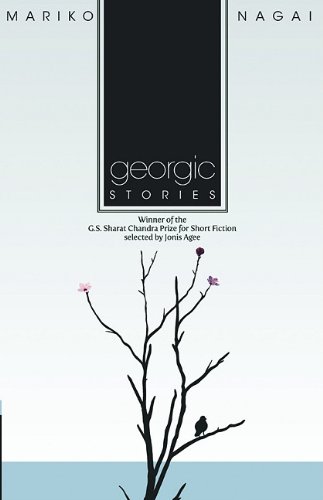Mariko Nagai, author of poetry and fiction books, and translator of modern and contemporary Japanese poems and fiction into English, was born in Tokyo and has lived in Europe and America most of her life.
The first book by Mariko I read was her beautiful book of poetry, Histories of Bodies, published in 2007 by Red Hen Press and winner of the Benjamin Saltman Poetry Award.
Her poetry has been called "both intimate and otherworldly. What appears to be coolly elegant at first draws you towards it and carries a roar, what appears to be built from simple images is, on a second reading, iridescent" (http://cutbankpoetry.blogspot.com/2008/06/histories-of-bodies-by-mariko-nagai.html), a poetry where "layers of desires collide and reoccur in surprising and, sometimes, unwanted places" (http://pbq.drexel.edu/issue77/content/prose/ParadoxofDesire.html).

Night after night, my father lay out
Dinner for her. He serves her the first tea.
My father’s walk tell the stories he does
Not tell as he limps after dinner to the river. Every night,
The mosquitos hunger for their mates, flesh, he hungers
For the end, as he did, her hand fisted
Over his, two first almost a globe, & the doctors
Kept pounding her, pounding, breaking him.
(From Hunger)
Mariko, who has received the prestigious Pushcart Award twice, in both poetry and short story, is also the author of a great short story collection, Georgic, published in 2010 by BkMk Press, winner of the G.S. Sharat Chandra Prize for Short Fiction, and currently a finalist for the Foreword Book of the Year Award. Jonis Agee, judge for the G.S. Sharat Chandra Prize, writes: "Mariko Nagai re-imagines the georgic, a pastoral form pertaining to rural life, to create a searing portrait of the cost of war, social and political strife, with sadness sharp enough to cut the tongue and grief so unbearable, the journey toward new life is so remarkable-it takes your breath to see such tenderness and truth. Through the palpable beauty of the natural world which envelopes the struggles of her characters, Nagai reveals the most profound mysteries of living and dying. Nagai has a voice and vision to be reckoned with. There is wisdom here, ancient and modern. It has never left us, it simply awaits the discoverer who cannot turn away, who must not let history be rewritten, who must bear witness as each generation has, to the cruelties and kindnesses, the observances that shape our lives. These stories will change you, change what you know, change how to imagine the lives of people around you. To read Nagai's tales is to remember why we always need stories, especially in times of war, when our humanity is so at risk, especially now."
Here's the beginning of one of the stories in the collection, Drowning Land:
 "As soon as dreams leave dreamers, abandoned or rejected like leaves in late autumn, brown and bogged with rain, they find birds to fly with, and make their way over the mountain; past the pasture where cows and time stand so still a painter could've painted it as still life; past the cows digesting their past slowly; and finally drop down to land on the roof of a house where the boy sleeps. Then they seep through the cracks, down the wide beam that holds the house up, and drop into the boy's mouth that's slightly open with a hint of snore. Dreams find their ways into the boy's sleep. He dreams people's thrown-away dreams, nightmares where children hide under beds to hide from imagined and real monsters, daydreams of great riches and loves that get interrupted by teachers who want facts, facts that they can see, facts, nothing but facts. Moments so real, more real than anything they know so that wherever they may be, whatever they may be doing, those things cease to matter. He dreams them all. Call him a dream collector. He dreams them all. And sometimes, he sees all that is hidden underneath, hidden under the faces people put on in the mornings, as soon as they wake up, dreams that are too near to the heart that only at nights do they dare to come out."
"As soon as dreams leave dreamers, abandoned or rejected like leaves in late autumn, brown and bogged with rain, they find birds to fly with, and make their way over the mountain; past the pasture where cows and time stand so still a painter could've painted it as still life; past the cows digesting their past slowly; and finally drop down to land on the roof of a house where the boy sleeps. Then they seep through the cracks, down the wide beam that holds the house up, and drop into the boy's mouth that's slightly open with a hint of snore. Dreams find their ways into the boy's sleep. He dreams people's thrown-away dreams, nightmares where children hide under beds to hide from imagined and real monsters, daydreams of great riches and loves that get interrupted by teachers who want facts, facts that they can see, facts, nothing but facts. Moments so real, more real than anything they know so that wherever they may be, whatever they may be doing, those things cease to matter. He dreams them all. Call him a dream collector. He dreams them all. And sometimes, he sees all that is hidden underneath, hidden under the faces people put on in the mornings, as soon as they wake up, dreams that are too near to the heart that only at nights do they dare to come out."You can read the rest of the story here: http://www.cortlandreview.com/issue/44/nagai_f.html
And also two more full stories, How We Touch The Ground, How We Touch, here: http://pbq.drexel.edu/issue81/fiction/nagai-mariko_how-we-touch-the-ground-how-we-touch.php
And Fugue, here: http://pbq.drexel.edu/issue83/fiction/nagai.php
And here's the link to Mariko's website: http://www.mariko-nagai.com/
Enjoy!

Nessun commento:
Posta un commento